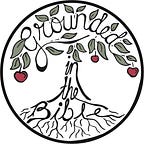If you want to receive Grounded in the Bible’s weekly Bible studies in your inbox each week, you can subscribe here! Join us as we "grow in the grace and knowledge of our Lord and Savior Jesus Christ."
In Part 1 of this lesson, we learned a few things about vines. Vines must be tended carefully if they are going to produce the best fruit. One of the most important tasks when tending vines is cutting off the branches that are diseased or are not bearing fruit and pruning the fruit-bearing branches. This helps keep the whole plant healthy and maximizes the crop.

In the Old Testament, the nation of Israel is God’s vine. God transplanted his vine from Egypt to the Promised Land, and he tended them so that they would flourish. But instead of a nation that glorified God, they only produced bad fruit. Instead of following God, they followed idols and themselves instead. Therefore, God had to replace that vine with the True Vine. Jesus is that true vine. Jesus not only remained in the Father but loved us so much that he laid down his life for us.
John 15:1-8: 15 “I am the true vine, and my Father is the gardener. 2 He cuts off every branch in me that bears no fruit, while every branch that does bear fruit he prunes so that it will be even more fruitful. 3 You are already clean because of the word I have spoken to you. 4 Remain in me, as I also remain in you. No branch can bear fruit by itself; it must remain in the vine. Neither can you bear fruit unless you remain in me.
5 “I am the vine; you are the branches. If you remain in me and I in you, you will bear much fruit; apart from me you can do nothing. 6 If you do not remain in me, you are like a branch that is thrown away and withers; such branches are picked up, thrown into the fire and burned. 7 If you remain in me and my words remain in you, ask whatever you wish, and it will be done for you. 8 This is to my Father’s glory, that you bear much fruit, showing yourselves to be my disciples.
3. What do we learn about Jesus from this statement?
In this visual picture that Jesus gives about the vine, we see three components of the whole: Jesus as the vine, God as the gardener, and us as the branches. We’ll look at Jesus (the true vine) and God (the gardener) in this section and look at us as the branches as we answer the next question.
Jesus as the Vine
John 15:1 says that Jesus is the “true vine.” What does this mean? If you read John 15 again, you will see that there is never any worry about the vine. The gardener isn’t concerned with whether the vine is good or bad. The gardener doesn’t have to cut back the vine itself. The gardener is only concerned with the branches. Why? Because Jesus is the true vine. The true vine doesn’t go bad. The true vine remains connected to the source of life—the Father. The true vine is faithful to keep the Father’s commands.
John 15:9-10: 9 “As the Father has loved me, so have I loved you. Now remain in my love. 10 If you keep my commands, you will remain in my love, just as I have kept my Father’s commands and remain in his love.
The true vine is a reflection of the One True God and in fact is so connected to the Father that they are one. The Father is the source of life for the Vine, and the Vine stays connected to the Father just as we as the branches need to stay connected to the Vine. As the true vine, Jesus has everything we need as branches to stay healthy and bear fruit.
The true vine is also the conduit between the source of life and the branches. We saw in the lesson on I AM the Way, the Truth, and the Life that Jesus is the only way to the Father. In the same way, the vine is the only connection that the branches have to the source of life—the Father. Without the vine, the branches die. But if the branches remain connected to the vine, then they will live and bear fruit.
But this passage tells us something else about Jesus as the vine. Jesus has remained in the Father, and out of his love for us, he laid down his life for us.
John 15:9-13: 9 “As the Father has loved me, so have I loved you. Now remain in my love. 10 If you keep my commands, you will remain in my love, just as I have kept my Father’s commands and remain in his love. 11 I have told you this so that my joy may be in you and that your joy may be complete. 12 My command is this: Love each other as I have loved you. 13 Greater love has no one than this: to lay down one’s life for one’s friends.
This is how Jesus was able to redeem the failed vine, Israel, and produce a true vine that would never fail. He lived a sinless life, which the Israelites could never claim, and therefore he was the perfect sacrifice to pay the penalty for our sins so that we wouldn’t have to face the fire of God’s wrath. This vine will always remain connected to the Father and will always bear fruit.
God as the Gardener
John 15:1 identifies Jesus as the true vine, but it also identifies God as the gardener. What is the role of the gardener in this story? The gardener is the one with the wisdom to know how to tend the vine. Which branches should be cut off? Which branches should be pruned? The gardener is the one who can make this decision.
But unlike a gardener, who can only see the outside appearance of the vine and branches, God can see into our hearts.
1 Samuel 16:7: 7 But the Lord said to Samuel, “Do not consider his appearance or his height, for I have rejected him. The Lord does not look at the things people look at. People look at the outward appearance, but the Lord looks at the heart.”
With God as the gardener and us as the branches, God can see into our hearts. He knows the hearts that will follow him and bear fruit, and he knows the hearts that will be hard-hearted and reject him. The ones that are hard-hearted, like the religious leaders in the parable Jesus told in Matthew 21:33-46, God cuts off and destroys.
In contrast, God will prune the hearts that will follow him and bear fruit. What does this look like practically? It means that he will work on your heart to convict you of sin so that you will abandon your sin and follow him in obedience. It means that he will guide you into the plan he has for your life so that you can bear fruit. This is the purpose of every Christian life.
What It Means to Bear Fruit
In last week’s lesson, I barely touched on the idea of bearing fruit as an outcome or reward for remaining in Christ. What does it mean to bear fruit? That’s what we want to find out this week. We’ll look at both what it means to bear fruit and why we need to bear fruit.
4. How should we respond?
Now it’s time to look at us as the branches. This passage in John 15 basically talks about two types of branches: branches that bear fruit and those that do not.
Branches that Do Not Bear Fruit
Other than not bearing fruit, what else do we know about these branches? What causes them to not bear fruit? The main problem is that they don’t remain in the vine. They try to bear fruit by themselves without the vine’s help. Any branch that tries to sustain itself apart from the vine will die and not bear fruit.
What happens to these branches? They will be cut off and burned. If they don’t bear fruit, they have no purpose anymore. They are just weak branches that suck the life out of the rest of the plant. The best thing to do with them is to get rid of them so they can’t harm the plant anymore.
This is what happens to those who decide that they want to live a life apart from Jesus, who want to go their own way and do their own thing. These branches have no value to the gardener. Therefore, he cuts them off and throws them away to be burned in the lake of fire.
Branches that Bear Fruit
Now let’s look at the other side—at the branches that do bear fruit. What do we know about these branches? Unlike the other branches, these branches have remained in the vine. These branches know that without the vine, they are nothing. Being connected to the vine and bearing fruit is what gives these vines their value and purpose.
However, these branches also have to go through the pruning process. They can’t keep every bud and every leaf that they produce. They have to submit to the gardener’s pruning process in order to be healthy and thriving.
In the same way, we who are Christians must remain connected to Jesus. If we try to live life without Christ, we will wither and die. We must remain in him. We also must submit to the work God is doing in our lives to prune the sin out and allow the life of Christ to flow through us.
Remain in Christ Word Study
Over the first part of this year, our church worked through a sermon series on the book of John, and in my personal devotionals, I’ve been working through the book of 1 John in my verse mapping. Both books, written by Jesus’ disciple John, talk a lot about the concept of remaining or abiding in Christ, and I’ve been struck that remaining in Christ is th…
Now it’s time for you to choose. Do you want to remain strong and healthy, bearing fruit for God’s kingdom? Or do you want to be cut off and end up in the fire? I will be praying that you remain connected to the True Vine.













